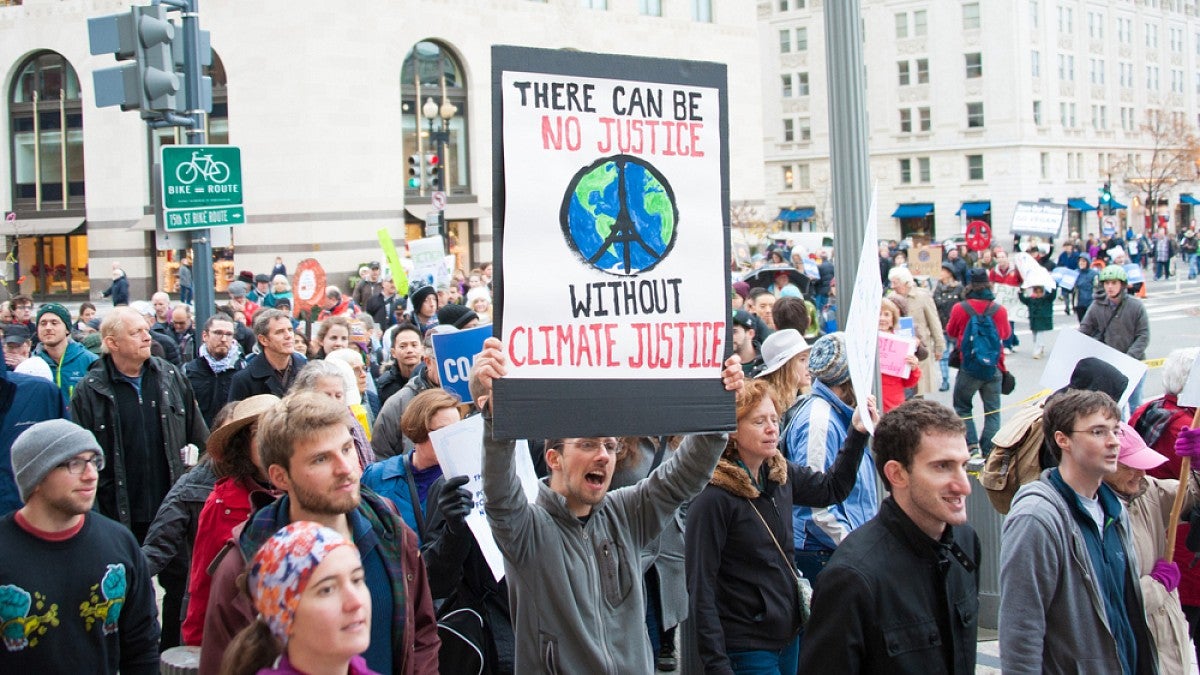One of the biggest legal battles over climate change could soon be tried in federal court in Eugene, and the University of Oregon is linked to the landmark lawsuit by more than the city that would host the trial.
A flock of UO students, alumni and faculty members are involved with Juliana v. U.S., a lawsuit filed on behalf of 21 young people who contend the government has threatened their constitutional right to a stable climate by promoting the production of fossil fuels. The youths’ lawsuit calls for the federal government to adopt a national climate recovery plan to aggressively address climate change by lowering carbon dioxide emissions enough to avert disastrous environmental damage.
Ducks have been connected to the lawsuit from its early beginnings: Two current students are among the plaintiffs, a legal theory at the heart of the case was developed by a UO law professor, and several attorneys are UO graduates. They all hope to see it actually go to trial, which is currently uncertain after Supreme Court Chief Justice John Roberts ordered a hold on the proceedings.
Rallies are planned in Eugene and 41 other states this Monday, Oct., 29, the day the case had been scheduled begin. The Eugene event will be from 8 a.m. to noon on the steps of the Wayne Morse Federal Courthouse downtown.
“On Monday, we rally for our right as American citizens to a fair trial," said Kiran Oommen, a 21-year-old plaintiff from Seattle. "No matter how much the federal government might try to deny us that right, we will have our day in court. ”
Here’s a deeper dive into how Ducks are involved in this legal battle against climate change.
The plaintiffs
Two of the 21 young plaintiffs, who now range in age from 11 to 22, are current students at the UO.
The lead plaintiff, Kelsey Juliana, is a Eugene native and environmental studies major. Now 22, she’s been a climate activist for more than half her life. Juliana was just 10 when she organized her first march for climate action, 15 when she co-filed her first lawsuit to push the government to address climate change, and 18 when she marched 1,600 miles from Nebraska to Washington, D.C. to urge world leaders to do more for the environment.
A year later, at 19, she filed the pending lawsuit, alongside the 20 other young people.
One of her co-plaintiffs is fellow Duck Tia Hatton, 21, also an environmental studies major at the UO. Hatton was inspired to become a climate change activist after her hometown of Bend received record low snowfalls from 2013-15 and underwent an enduring drought during the corresponding summers.
Both Oregonians have been motivated by the environmental changes they’ve witnessed in the region over the last several years, including droughts and heat waves. All of the plaintiffs involved in the case have stories about how climate change has hit home for them.
“Seeing how climate change has had an impact in just five years, and seeing how little action those who hold political power have enacted, makes me nervous and a little disappointed,” Juliana told Scientific America in an interview.
The legal theory
One legal argument the lawsuit draws from is connected to the UO, as it is partly rooted in a theory developed by UO law professor Mary Christina Wood in 2008.
The two core arguments the plaintiffs are making is that their fundamental rights to life, liberty, and property have been violated and that federal agencies have failed to protect “essential public trust resources” by promoting fossil fuel policies that have contributed to planetary warming and climate destabilization.
Wood’s scholarship applies the public trust doctrine to climate crisis. The long-established principle obliges government to act as a trustee of natural resources such as land, water and air and protect them as commonwealth for the endurance of the nation.
Wood applied that concept to the atmosphere, developing a legal approach known as “atmospheric trust litigation.” Citizens around the world have invoked this principle in energy policies that now jeopardize human lives and liberties through climate disruption.
In Juliana v. U.S., the young litigants are arguing that the government continues to take affirmative steps promoting the use of fossil fuels that endanger their ability to live safely. The U.N. secretary general said in early September that the planet faces a direct, existential threat and the world has only until 2020 to take decisive action necessary to prevent runaway climate change.
“Scientists warn that the habitability of the planet is imperiled,” Wood said. “Given these high stakes, and the urgency presented by climate tipping points, there is a reason the Juliana case is called the biggest case on the planet.”
The nonprofit
The nonprofit organization Our Children’s Trust is representing the plaintiffs and includes four UO law school graduates: Elizabeth Brown, Nate Bellinger, Gordon Levitt and Andrew Welle. Several other UO law school alumni have worked on other atmospheric trust litigation cases around the globe.
Our Children’s Trust, based in Eugene, launched legal proceedings in every state in the country, as well as in other countries, and more are being planned. The group’s mission is to amplify the voice of young people to secure a stable climate and healthy atmosphere for the benefit of present and future generations.
Julia Olson, the lead attorney on this case, discovered Wood’s work in 2010 and used it as a platform to launch climate lawsuits through Our Children’s Trust. She filed Juliana v. U.S. in 2015, during the Obama administration, but the trial has undergone numerous delays as both the Obama and Trump Justice Departments have sought to dismiss the case.
Attorneys from Our Children’s Trust have filed a response to the department’s latest motion and plan to continue their efforts to have the suit heard in federal court.
—By Emily Halnon, University Communications


